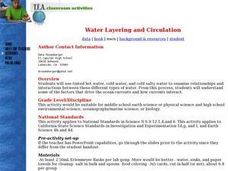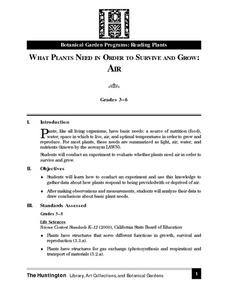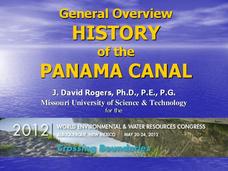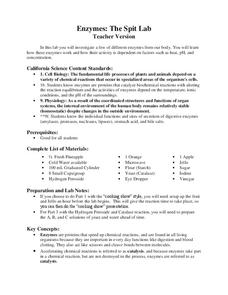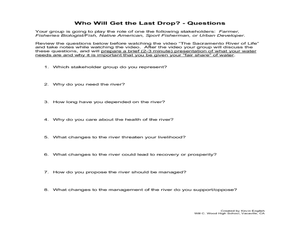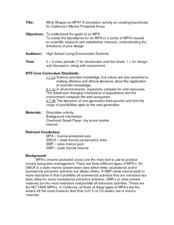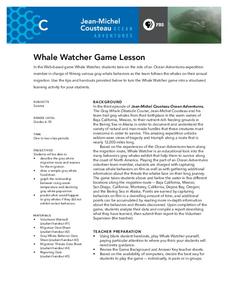Curated OER
History in the Making: The Tortilla
Fourth graders examine the history of the tortilla and extend the study across the curriculum. In this history of the tortilla lesson, 4th graders research the background of the tortilla, determine the ingredients, and work with the...
Curated OER
Water World
Students explore the various steps of the water cycle. They identify the three steps in the water cycle and how they are related. Students describe three ways to conserve water. Students explore the origin of the water source that...
Forest Foundation
Forest Watersheds
Where does the water we use come from? To understand the concept of a watershed, class members study the water cycle and then engage in an activity that simulates a watershed.
Curated OER
Plate Tectonics: First Grade Lesson Plans and Activities
A set of first grade geology lessons focuses on plate tectonics and movement of plate boundaries. During the pre-lab, learners experience three types of plate movement through a kinesthetic demonstration. The lab demonstrates stresses...
Curated OER
Water Layering and Circulation
Young scholars examine relationships and interactions between different types of water. They experiment with colored water of different temperature and salinity and discuss how the results relate to real ocean currents.
Curated OER
Floods: Rising Waters and You
High schoolers will examine how floods work and why they can cause so much damage and destruction. They use a stream table to observe the processes that lead to flooding and the effects of floods on human-made structures. Includes a...
Curated OER
What Plants Need in Order to Survive and Grow: Air
Young scholars conduct an experiment to determine whether plants need air in order to survive and grow. They discuss natural resources, analyze slides, and observe and record data from the experiment.
Curated OER
Maps and Globes: Where in the World are We?
Students explore maps and globes. In this introduction to map and globe concepts lesson, students identify features of physical maps, political maps, and globes. Students locate land and water, and recite a poem about the names of the...
Curated OER
California's Resources
Young scholars research the natural resources of the state of California. They read a chapter of their social studies text, write and answer questions for the chapter, and create illustrations for five vocabulary terms.
Curated OER
Arsenic Contamination: Water Filtration
Learners work in groups to design a filtration process that will separate clean water from polluted water. They organize data in tables or graphs and present their findings to the class. Students identify further safety protocols that...
Education World
Every Day Edit - Minnesota, Land of Lakes
In this everyday editing worksheet, students correct grammatical errors in a short paragraph about Minnesota. The errors range from punctuation, capitalization, grammar, and spelling.
University of California
Plankton
Plankton: so much more than just a SpongeBob character. Three different activities have kids looking at both phytoplankton and zooplankton in pictures, as well as collecting their own samples (depending on your access to a saltwater...
Missouri University of science & Technology
General Overview History of the Panama Canal
Called the Eight Wonder of the World by some and the Big Ditch by others, the Panama Canal is indeed an engineering marvel. The long, complicated, and sometimes controversial history of the canal is captured in a presentation loaded with...
LABScI
Acids and Bases: Cabbage Juice pH Indicator
Explore the range of pH using an assortment of household liquids. Scholars create their own pH indicators from cabbage and determine the pH of several liquids. To further their exploration, individuals use the same liquids to create...
LABScI
Acoustics: The Sound Lab
If the delay between a sound and its echo is less than 1/10th of a second, the human ear can’t distinguish it. Through the use of a Slinky, rubber band guitar, and straws, scholars explore where sound comes from and how it travels. Whole...
Illustrative Mathematics
Mile High
What is the meaning of sea level? This resource helps your class understand the meaning of elevations above, below, and at sea level. Provides for good discussion on using positive and negative numbers to represent quantities in the real...
LABScI
Cell Diffusion and Permeability: The See-Thru Egg Lab
Create a model to study a microscopic phenomenon. The seventh of 12 lessons uses an egg (without its shell) to represent a cell membrane. Using different solutions, learners explore the concept of cell diffusion. They monitor...
LABScI
Photosynthesis: How Do Plants Get Energy?
Examine the mechanism of photosynthesis through different light scenarios. Pupils vary the amount and type of light exposure on plant leaves in the fifth lesson plan in a 12-part series. Through observation, they determine the rate of...
LABScI
Enzymes: The Spit Lab
Enzymes in our bodies each have a job to do. Learn the factors that affect the activity of some enzymes using the third activity of an informative 12-part biology series. A three-part laboratory activity asks teams to investigate how...
Curated OER
Houghton Mifflin Social Studies/Chapter 13, Lesson 1 The Past Shapes the Future (pp. 292-295)
Fourth graders reflect upon the events of the past in order to make cognitive connections to present or future history. Students use Blooms Taxonomy to attain higher levels of thinking.
Curated OER
Who Will Get the Last Drop?
Students discuss the importance of California's water system. In this earth science lesson, student play the role of different stakeholders. They present a 2-3 minute argument on their group's perspective about their need for water.
Curated OER
Problems Facing Agriculture
Fourth graders examine the conflicts over land ownership and water in the second half of the 1800s in California. They write a criticism about the problems that farmers faced, and work in pairs to define key vocabulary terms.
Curated OER
What Shapes a MPA?
Students identify the three types of MPA in California. In this marine science lesson, students analyze information provided to design a new MPA. They justify their reasoning in class.
Curated OER
Whale Watcher Game Lesson
Learners study the gray whale migration and compare their populations to the increasing ocean temperature. In this whale watcher lesson students draw a food chain.






